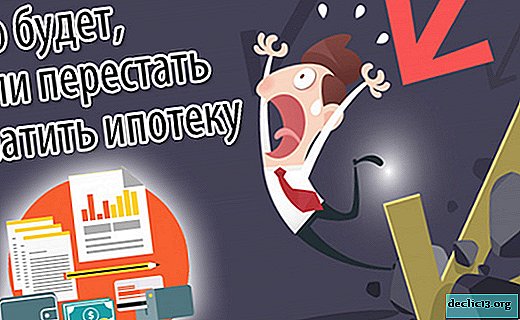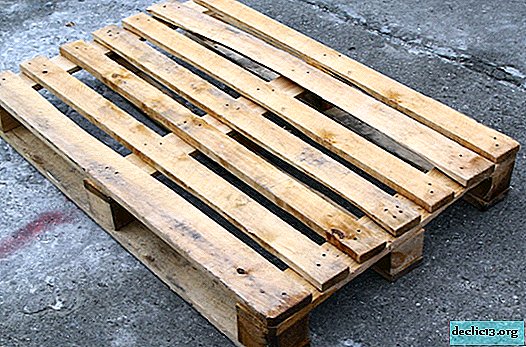What will happen if you stop paying your mortgage and what consequences could there be?
Hello! Hard times have come, that is, financial difficulties have come. I will not explain in detail - a very long story. But the issue of debt payments is acute - "What will happen if you stop paying the mortgage and what measures will the bank take in such cases?" Thank.
Eugene, 28 years old, Russia, Moscow.
Hello. The main responsibilities of the borrower, who concluded mortgage agreement, is an timely and complete making payments, as well as maintaining the subject of pledge in good condition.
With the last paragraph, usually there are no problems. However, the assumption of delays or even a complete refusal to make payments in our country is a frequent phenomenon. Therefore, the question often arises: what consequences will occur if you refuse to pay mortgage payments.
Responsibility for such actions is determined by applicable law, as well as the terms of the loan agreement. In practice, each bank individualizes measures taken in relation to unreliable borrowers.
Applied measures of influence on the borrower are determined:
- credit institution policy;
- circumstances of arrears;
- current financial position of the debtor;
- state of the mortgage at the time the debt arises.
Moreover, the policy of a credit institution depends on the economic situation, primarily on the mortgage market.
At the moment, in our country, the government has decided to abandon a number of support programs for citizens who decided to apply for a mortgage. At the same time, rates are gradually declining. In such conditions there is no certaintythat credit organizations will be loyal to borrowers.
 About what will happen if you stop paying the mortgage, what measures the bank will take and what the consequences will be for the debtor - read in this issue
About what will happen if you stop paying the mortgage, what measures the bank will take and what the consequences will be for the debtor - read in this issue
1. What will the bank do if the debtor ceases to pay a mortgage
According to the current legislation, as well as the standard terms of the mortgage agreement, the bank has the right to take the following measures with respect to debtors:
- Accrual of forfeit in the form of fines and penalties. Their size, as well as the terms of accrual, are determined by the loan agreement;
- Sending a request to the borrower to eliminate violations in the payment procedure. If they are not met, appeal to the court;
- Restructuring or refinancing a mortgage;
- Holding liable co-borrowers or guarantors, if they participated in the mortgage registration process;
- Foreclosure on the subject of mortgage collateral, that is, the sale of real estate serving as collateral;
- Transfer of debt for collection to a collection agency;
- Sale of debt with the consent of the borrower to a third party or without the consent of another bank. Bidding through bankruptcy auctions.
We also recommend reading the article - “How to declare bankruptcy (to an individual or individual entrepreneur)”.
2. How the bank fights mortgage arrears
Despite the fact that the bank has the right to take rather tough measures against the borrower, in most cases at the initial stage the lender tries peacefully settle the situation.
There are several reasons for the preference for a peaceful settlement:
- litigation with the borrower, guarantor and co-borrowers is a long and very costly process;
- sale of the subject of pledge or its conversion into the ownership of the creditor is a rather complicated process that requires additional costs and time;
- collectors, if recovered, will have to pay commission, the bank usually has its own specialists who deal with issues with problem debtors;
- selling a mortgage loan, the bank loses a lot of money, therefore, they resort to such a procedure only when it is already impossible to recover debt by other methods or it is not profitable.
At the initial stage, the lender always tries to find out what is the reason for the debtor's failure to fulfill his obligations. For this purpose, communication may be used. phone calls, electronic and registered letters.
If it becomes clear that the financial difficulties are temporary, and the borrower is not going to refuse payments, they can offer him debt restructuring programs. Moreover, in case of difficulties with payment, it makes sense to contact the bank yourself. This will help solve the problem faster with minimal impact. Details about what credit restructuring is and how it is carried out, we have already told in our article.
The debt collection process starts when it became clear that the borrower cannot or does not want to continue to repay the mortgage, and on an ongoing basis. In this case, the bank first turns to collectors. If they can’t help, they will be prosecuted. judicial authorities.
Most often, real estate, which acts as collateral for a mortgage, fully covers arrears under a loan agreement. That's why it is most effective to collect debt precisely through the implementation of the collateral object. Wherein does not matterwhether the subject of the pledge is the only housing of the borrower, whether children are registered on this square.
📎 We recommend reading the article - “How to get money on the security of real estate (apartment)”.
An exception to all foreclosure measures described above occurs when the borrower draws up insurance. However, an important condition for this is that the insurance contract should state that in certain situations the insurer pays a mortgage loan for the debtor. Such options are possible if the debtor has insured himself against a possible loss of work, as well as in case of illness.
If the borrower has an insurance policy, this can be a serious help in solving problems with mortgage payments. However in most cases, insurance involves payments only in case of the death of the borrower or in case of serious damage to the collateral.
3. What to do to the debtor if there are problems with paying the mortgage
When there are problems with mortgage payments, the debtor must first determine whether he has a goal to keep the subject of the pledge. The order of further actions will depend on this.
If the borrower wants to leave the property in his property, he will have to resort to restructuring or refinancing services.
Restructuring drawn up only in the bank that issued the mortgage. According to the general rules, the conditions of this program are determined individually by the credit institution. In this case, the bank won't agree restructuring, if it becomes clear to him that the debtor’s financial problems are long-term or even permanent.
However, there are a number of situations where credit organizations are easy enough to go for restructuring:
- temporary loss of work;
- diseases that are temporary;
- birth of a child.
A credit institution perceives such circumstances as quite serious reasons that allow it to offer the debtor a deferral or installment plan of payments, as well as to revise the terms of payment for a mortgage in order to reduce the financial burden.
Refinancing experts recommend using when the mortgage has been paid for quite a long time. In recent years, there has been a tendency to lower rates. If the loan was taken at high interest rates, it makes sense to contact the bank for this service.
Advantage refinancing is that You can apply for it at any credit institution. Accordingly, the borrower expands the possible conditions for selection.
If the debtor has no purpose to keep the subject of the pledge, Do not delay the solution to the problem. It makes sense to put up a proposal to the bank to use the right of pledge. Another option is to deal with the sale of real estate together with a credit organization. It will be possible to repay the loan from the funds received.
We also recommend reading the article - “How to quickly and profitably sell an apartment”
In fact, experts advise don't hide from the bank. As soon as there are problems with payments, you must immediately contact a credit institution to find solutions to a difficult situation.
We hope we were able to answer the question - what will happen if you stop paying the mortgage. The Richpro.ru team wishes financial prosperity and never get into such situations!

















